Migration’s impact on social cohesion has been a prevalent topic in IELTS Writing Task 2 evaluations. Given the increasing global movement of people, this topic surfaces frequently, testing candidates’ ability to articulate complex socio-economic issues. With the rising trends of globalization, this subject is anticipated to remain significant in future assessments.
Analysis of Past IELTS Writing Task 2 Prompts
Upon reviewing past IELTS Writing Task 2 questions, it’s evident that migration and its effects on society are recurring themes. Prompts often delve into how migration influences various facets of societal life, including economic conditions, cultural integration, and community harmony.
Actual and Relevant Past Prompts:
- “Migration is a key factor in shaping modern societies. Discuss the impact of migration on social cohesion.”
- “As more people move from rural to urban areas, social ties are being increasingly strained. To what extent do you agree or disagree with this statement?”
- “Global migration is increasing and is having profound effects on local communities. Explain the impacts and suggest ways to mitigate any negative effects.”
Selected Prompt for Sample Essay:
“As migration continues to rise globally, the challenge of maintaining social cohesion within societies becomes more pressing. Discuss the impacts of migration on social cohesion and suggest measures to enhance this cohesion.”
Breakdown of the Prompt
First, we need to identify the key components of this task:
- Topic Area: Migration and social cohesion
- Task Requirements:
- Discuss impacts of migration on social cohesion
- Suggest measures to enhance social cohesion
Sample Essay
Introduction
Migration is a phenomenon that significantly shapes the demographic and social structure of societies. As more individuals move across borders or from rural to urban areas, the challenge of fostering social cohesion becomes critical. This essay will explore the impact of migration on social cohesion and recommend measures to reinforce unity within diverse communities.
Body Paragraph 1: Positive Impacts of Migration on Social Cohesion
Migration can have numerous positive effects on social cohesion. Firstly, migration enriches the cultural fabric of a society, introducing new traditions, cuisines, and languages, fostering a more cosmopolitan environment. This diversity can promote intercultural dialogue and mutual understanding among different ethnic groups. Moreover, migrants can fill labor market gaps, thereby contributing to economic prosperity and potentially reducing social tensions related to unemployment and economic disparities.
Body Paragraph 2: Negative Impacts of Migration on Social Cohesion
However, migration also presents challenges to social cohesion. A significant influx of migrants can strain public services, such as healthcare and education, resulting in competition and resentment among local populations. Social isolation of migrants, often due to language barriers and cultural differences, can further exacerbate social fragmentation. There may also be a rise in xenophobia and ethnic tensions, fueled by misconceptions and prejudices against migrants.

Body Paragraph 3: Measures to Enhance Social Cohesion
To mitigate these issues and enhance social cohesion, several measures can be undertaken. Governments should implement policies that promote the integration of migrants, such as language and cultural orientation programs. Community-building activities that involve both migrants and locals can facilitate mutual understanding and cooperation. Additionally, equitable access to public services for all residents, regardless of their migratory status, can alleviate competition and foster a shared sense of belonging.
Conclusion
In conclusion, while migration can both positively and negatively impact social cohesion, the adoption of inclusive policies and community initiatives can significantly enhance societal harmony. Understanding and embracing cultural diversity, along with ensuring equal opportunities, are key to building cohesive and resilient communities.
Word Count: 320
Key Considerations When Writing About This Topic
Vocabulary and Grammar
- Essential Vocabulary:
- Cohesion (noun) /kəʊˈhiːʒən/: Unity or togetherness within a group.
- Cosmopolitan (adjective) /kɒzməˈpɒlɪtən/: Familiar with and at ease in many different countries and cultures.
- Xenophobia (noun) /zɛnəˈfəʊbɪə/: Dislike of or prejudice against people from other countries.
- Integration (noun) /ɪntɪˈɡreɪʃən/: The action of incorporating a racial or religious group into a community.
- Equitable (adjective) /ˈɛkwɪtəbl/: Fair and impartial.
Grammar and Sentence Structures
- Utilize complex sentence structures to demonstrate language proficiency:
- Conditional Sentences: “If communities promote intercultural activities, mutual understanding will be enhanced.”
- Relative Clauses: “Migrants who contribute to the economy can help alleviate local labor shortages.”
- Passive Voice: “Policies to promote social cohesion have been implemented in many countries.”
Conclusion
Migration’s impact on social cohesion is a multi-faceted issue that requires nuanced analysis and thoughtful solutions. By understanding both the benefits and challenges posed by migration, and implementing strategies to address these, societies can promote greater harmony and unity. Future IELTS candidates should be prepared to discuss this evolving topic, anticipating its continual relevance in global discussions.
Additional Practice Prompts
- “Urbanization often leads to increased migration. Discuss the effects of urban development on social cohesion.”
- “Economic migration is on the rise. Evaluate its impact on the host countries and suggest ways to mitigate any adverse effects.”
- “Cultural identity plays a crucial role in social integration. Discuss.”
By practicing these prompts, candidates can better prepare for similar themes that are likely to appear in future IELTS Writing Task 2 exams.